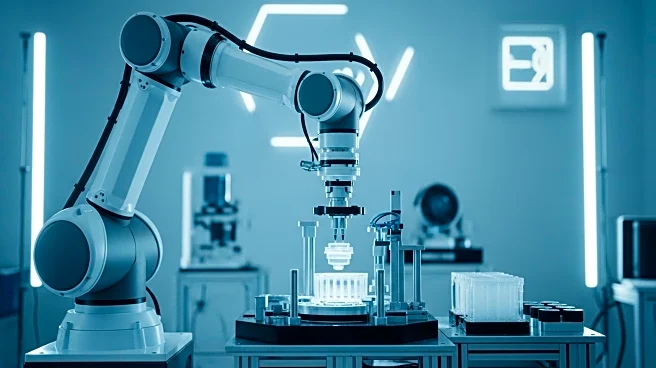What is the story about?
What's Happening?
Multiply Labs, based in California, has announced the development of a robotic biomanufacturing cluster that significantly reduces the cost of manufacturing cell and gene therapies. Utilizing collaborative robot arms from Universal Robots, the system achieves a 74% cost reduction compared to traditional manufacturing processes. This innovation also improves space utilization, allowing up to 100 times more patient doses per square foot of cleanroom space. The technology employs 'imitation learning,' where robots replicate expert human techniques, enhancing efficiency and repeatability. This development is part of a broader trend in the pharmaceutical industry to leverage automation for cost-effective and scalable production.
Why It's Important?
The introduction of robotic biomanufacturing by Multiply Labs represents a significant advancement in the pharmaceutical industry, particularly in the production of cell and gene therapies. By reducing costs and increasing production efficiency, this technology could make these therapies more accessible to patients, potentially transforming treatment options for various diseases. The ability to produce more doses in less space also addresses logistical challenges in manufacturing, which could lead to faster delivery times and improved patient outcomes. This innovation may encourage other companies to adopt similar technologies, further driving down costs and expanding access to advanced therapies.
What's Next?
Multiply Labs is likely to continue refining its robotic manufacturing processes and may seek partnerships with pharmaceutical companies to implement this technology on a larger scale. The success of this initiative could prompt regulatory bodies to develop new guidelines for robotic manufacturing in the pharmaceutical sector. Additionally, other companies may explore similar technologies, leading to increased competition and innovation in the field. As the technology gains traction, stakeholders such as healthcare providers and patients could benefit from more affordable and readily available cell and gene therapies.
Beyond the Headlines
The use of robotic technology in cell therapy manufacturing raises ethical and regulatory considerations, particularly regarding the role of automation in healthcare. As robots take on tasks traditionally performed by humans, questions about job displacement and the need for new skill sets in the workforce may arise. Furthermore, ensuring the safety and efficacy of therapies produced through automated processes will be crucial, requiring rigorous testing and validation. This development also highlights the potential for robotics to revolutionize other areas of healthcare, prompting discussions about the future of medical technology.















